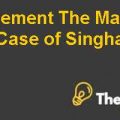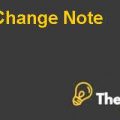- We need to determine the price that should be paid for Pecom? Page 9 and develop a Free cash flow model discounted excel model used for this analysis. I attach the data given in the annexes in excel format. ( Solution referred in Excel)
- How could Petrobras pay for Pecom (page 8 button paragraph) Financing strategy?
There was another main concern for Petrobras, which was regarding selection of financing strategy to fund the acquisition of Pecom. Different options were available in the form of cash, securities, or combination of both; it was a sensitive issue. Petrobras had a strong goodwill and sound identity in the market; however, market situations were not in favor of companies from emerging countries; market conditions were worsening by July 2002. Go for local funds meant paying high interests on short-term securities lesser than 3 years. International markets were already closed for organizations from emerging countries. Floating the equity was the final option, but it could send an alarming message about Petrobras’s current price in fact reflecting its real equity value. Thus, it endangered the market anticipation, however, Petrobras could reduce its cost of capital, and as a result it could improve its future results and market performance. Raising funds through internal source (equity financing) is more expensive as compared to loan from outsiders (Debt Financing) like banks and other stakeholders. Further, interest expense on debt financing is a taxable expense, which lowers the amount of tax payable against net profit.
- 3. Was the purchase of Pecon a good opportunity to increase the Petrobras diversification, or, was it a risky operation in a time of instability?
Petrobras was not yet focused on the global market. Geographic diversification strategy was under consideration for Petrobras to focus on global market with the objective to assemble a portfolio of upstream assets in Latin America, the Gulf of Mexico, the Caribbean, and West Africa. The general idea after that geographic diversification was for Petrobras to leverage its deepwater capabilities obtained in the Campos Basin. Furthermore, since 95% of Petrobras’s upstream reserves were depended to the risks of only one country. Brazil, the company had a strong strategic ground for expanding its international business. The Petrobras’s decision to acquire Pecom was the part of geographical diversification outside Brazil. Though, the acquisition would be feasible but its arrangement would require regulatory approval. Argentina was in the center of a financial crisis, and Brazil faced economic challenges of its own. Many Brazilians thought that the economic recession would extend to their country, and they were worried about the fiscal deficit and the ongoing decrease of the Brazilian Real against the U.S dollar that caused inflation. There was also substantial political uncertainty in Brazil due to the upcoming general elections in October 2002. Some analyst feared that the expected candidate for president, Luiz Inácio Lula da Silva of the Workers' Party would alter Brazil’s existing economic and legal framework if he was selected as the president. To evaluate whether the acquisition would be feasible for shareholders through an acceptable return on investment, Petrobras had to estimate a weighted average cost of capital for the transaction. After having implemented a policy of stricter capital discipline, only projects with a return on invested capital above 14% were acceptable to Petrobras.
- 4. We need to define how to incorporate the country risk given the economical circumstances in Argentina by July 2002.
Latin America’s long norm of economic and political instability placed companies to a countless of risk factors, consisting of currency devaluation, repatriation, capital controls, and expropriation, however, these risks are different in each country scenario, as these risks vary over time and differ from country to country. Argentina and Brazil both had embraced improvement over the last decade, supported by the International Monetary Fund (IMF) and the World Bank. Actions such as exchange rate stabilization, free capital flow systems, lower import tariffs to encourage trade, and privatization of nationalized companies were put into practice so as to cover the mode towards incorporation with international market.
However, the scenario of Argentina was more severe in case of financial crisis. In case of Argentina, it is a challenging task to formulate the appropriate country risk premium for the valuation of Pecom. J. P. Morgan’s Emerging Market Bond Index (EMBI) was the most used method to derive country risk premium, which calculates the difference between external sovereign debt instruments of emerging markets with U.S. Treasury Bills of the same period (refer the exhibit 17). Up to the mid-2001, Brazil and Argentina both countries had same country risk premium, but Argentina’s country risk premium increased in 2002; it was an issue to incorporate such increase into discount factor for the valuation of Pecom.
Drilling South Petrobras Evaluates Pecom Case Solution
According to team members of Batista, there were some issues in estimating weighted average cost of capital, but the uncertainty about country’s risk premium and the suitable cost of capital to estimate cash flow model directed ...............
This is just a sample partial case solution. Please place the order on the website to order your own originally done case solution.
Brazilian oil company Petrobras, evaluates the acquisition of Argentine oil company Perez Companc Group (Pecom). The acquisition will increase the reserves of Petrobras "oil and expand their interests outside of Brazil, is an important step for the largest company in Brazil. Pecom for sale because it has been hard hit by the financial crisis in Argentina. Students have the opportunity to assess the impact of the strong devaluation of the company. There also considerable uncertainty about how to value Pecom, and students have to weigh the importance of country risk in determining the appropriate discount rate to use in the evaluation. Finally, there is also uncertainty about its future Petrobras, as the Brazilian government controls it. Students can review the effectiveness of the changes in the corporate management by Petrobras, in spite of its current reference to the Brazilian state and the political uncertainties associated with that identity. Students will examine various methods of assessment and the impact of policies on cross-border acquisitions. For executable tables (courses), please contact our customer service department in custserv@hbsp.harvard.edu. «Hide
by Mihir A. Desai, Ricardo de-Reisen Pinho Source: Harvard Business School 27 pages. Publication Date: November 24, 2003. Prod. #: 204043-PDF- ENG













